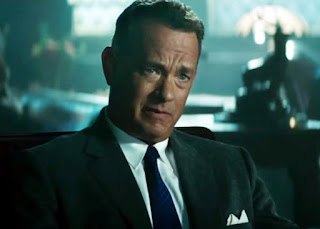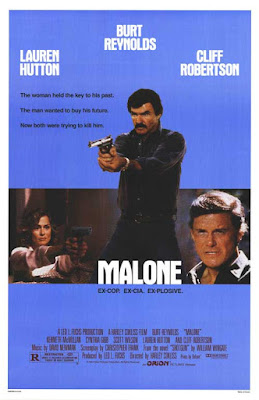BONE TOMAHAWK
(US/UK/France - 2015)
Written and directed by S. Craig Zahler. Cast: Kurt Russell, Patrick Wilson, Matthew Fox, Richard Jenkins, Lili Simmons, David Arquette, Evan Jonigkeit, Kathryn Morris, Sid Haig, Fred Melamed, Michael Pare, Sean Young, James Tolkan, Jamison Newlander, Geno Segers, Zahn McLarnon. (Unrated, 132 mins)
An instant cult classic that actually earns the distinction, the horror-western hybrid BONE TOMAHAWK is the slow-burning directorial debut of novelist/musician/jack-of-all-trades S. Craig Zahler. Zahler's toiled on the fringes for much of his career, with his biggest brush with fame being when he was commissioned to script a ROBOTECH adaptation back in 2007 that ultimately never happened. He wrote the 2011 DTV horror film ASYLUM BLACKOUT, and in 2012, he had a martial arts series titled DOWNTOWN DRAGONS in the works for FX, but the network never moved it beyond the planning stage. Zahler found acclaim for his "western noir" novels like 2010's A Congregation of Jackals and 2013's Wraiths of the Broken Land, both books finding a huge fan in Kurt Russell, and the two became friends. Zahler wrote BONE TOMAHAWK for the legendary actor and the project was a labor of love--made for just $1.8 million, a shoestring budget by today's standards--that took several years to become a reality. It's a western like no other, one of the strangest and grisliest films of the year, and the kind of offbeat, original work that you just don't see much of these days. There's a reason it's getting a very limited theatrical release and being shuffled off to VOD. There's very little concern for commercial appeal here, though it will undoubtedly find an appreciative audience that will show it a lot more love than mainstream multiplexers ever would. Let there be no doubt: for better or worse, Zahler made exactly the film he wanted to make.
In the tiny town of Bright Hope, doctor Samantha O'Dwyer (Lili Simmons), Deputy Nick (Evan Jonigkeit), and injured outlaw Purvis (David Arquette) are abducted in the middle of the night from the sheriff's office by a tribe known as the "Troglodytes." Stone-age cannibals living undetected in caves in the vast terrain several days away from Bright Hope, the tribe came in search of Purvis who, with his late cohort Buddy (Sid Haig), disturbed a Troglodyte burial site and now everyone must pay the price. Sheriff Hunt (Russell), his loyal deputy Chicory (Richard Jenkins), sartorially dandy, lothario gunman John Brooder (Matthew Fox), and, against the wishes of everyone, Samantha's injured husband Arthur (Patrick Wilson), hobbling around and delicately nursing a broken tibia being held together by two splints, embark on the long journey to find Mrs. O'Dwyer and Deputy Nick.
Of course, they encounter every obstacle on the way--the elements, their horses get rustled away, Arthur's leg keeps needing reset--and for about 90 minutes, it's a harsh, brutal western. That's just an opening act for the harrowing last section of the film, when the heroes encounter the Troglodytes and are taken prisoner, at which point the film turns into what might happen if Ruggero Deodato remade THE SEARCHERS. For all the talk of Eli Roth's THE GREEN INFERNO being the big 2015 Italian cannibal homage, time will show that BONE TOMAHAWK was the better gutmuncher throwback, despite its old west setting (the Troglodytes are legitimately terrifying and far more effective than the cannibal tribe in Roth's film). But before all that, in character-driven sequences that many may find laboriously-paced, Zahler spends a lot of time establishing who these people are and what life is like in Bright Hope, engaging in world-building the likes of which you'd find in a novel. That kind of detail is uncommon in most movies today and yes, BONE TOMAHAWK takes a good 40 minutes to really get rolling, but viewer patience pays off by the end, when you realize just how well you know these people and how emotionally invested you are in the horrific, nightmarish predicament in which they've found themselves. Russell (his facial hair a work-in-progress for its epic state in Quentin Tarantino's upcoming THE HATEFUL EIGHT, which he worked on immediately following this) is so good here and has one particular line of dialogue late in the film that's so devastating and heartfelt that it brought tears to my eyes, and I don't get like that over movies, especially cannibal horror westerns. The performances are just terrific across the board. Every few minutes, Jenkins, basically playing the chatty, Gabby Hayes/Walter Brennan old coot sidekick, gets some goofy bit of dialogue or there's some sardonically funny and quotable line from somebody (Sheriff Hunt's deadpan reaction to seeing Chicory's geriatric horse: "That is not a handsome horse") that really makes you come to know and care about the characters.
BONE TOMAHAWK overcomes some early jitters over the possibility of gratuitous fanboy-pandering with the brief presence of cult horror scenesters and convention regulars like Haig, Michael Pare, Jamison Newlander (THE LOST BOYS' Alan Frog) as the mayor, and Sean Young as the mayor's abrasive, henpecking wife, but they're soon out of the picture when the rescue mission gets underway. In an age when horror filmmakers approach their movies with a sense of entitlement that it's a cult classic right out of the gate, it's nice to see a film take some chances and risk alienating the audience, and to see the creative force behind it earn the trust of experienced lead actors who typically don't do this kind of "extreme" fare. Unfolding just like a really good book, BONE TOMAHAWK very slowly and deliberately pulls you in and its power sneaks up you. It's the kind of film where revisits will reveal something new and interesting that you didn't catch before. I can't wait to watch it again. Even the really gross parts.










































